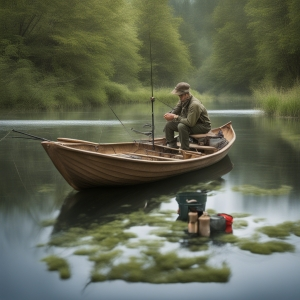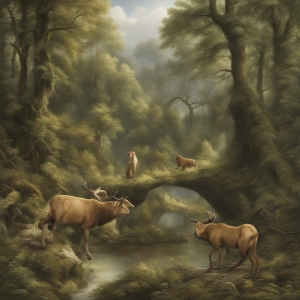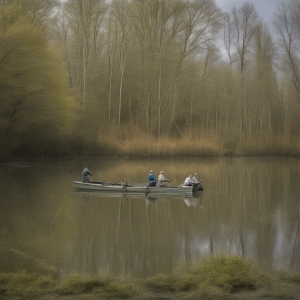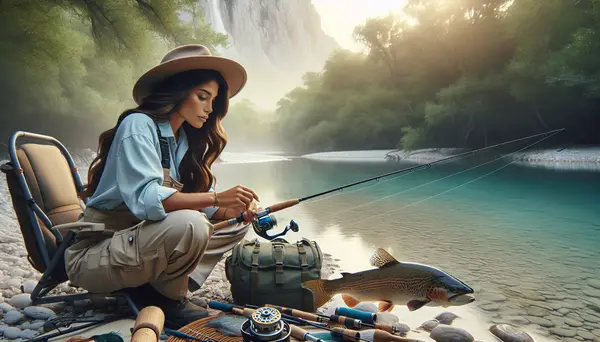Table of Contents:
Fishing and Conservation: An Introduction
Angling, as we know it, is much more than just a recreational activity. It plays a vital role in not only connecting us with nature but also acts as a powerful force in preserving it. When the words fishing and conservation are used together, one might question how these two coincide. This article aims to shed light on how the sport of fishing has evolved into a tool for conservation, and how the angling community is making significant leaps towards preserving nature.
The Role of Anglers in Nature Conservation
Anglers often are nature lovers at heart. They appreciate the serenity of a calm lake and the beauty of a flowing river. This connection with nature makes them strong advocates for its protection. They are often the first to notice changes in fish populations or water conditions, and they take steps to address these issues. In many cases, anglers have been the driving force behind local conservation efforts.
Anglers do this through a variety of ways. They follow sustainable fishing practices like catch and release, limit their catches, and avoid areas during sensitive times, like spawning seasons. They also work to improve fish habitats, whether that means clearing debris from rivers or advocating for the protection of vital ecosystems. And they educate others, spreading the word about the importance of conservation and what everyday people can do to help.
Pros and Cons of Angling and Nature Conservation
| Pros | Cons |
|---|---|
| Anglers assist in maintaining the balance of aquatic ecosystems through catch and release. | Some fishing methods can cause harm to habitats and other aquatic creatures. |
| Licenses and fees fund conservation efforts. | Overfishing can lead to a decline in certain fish populations. |
| Anglers can provide valuable data for scientific research. | Caught fish, even when released, can suffer stress, injury, or death. |
| Responsible fishing promotes appreciation for nature and outdoors. | Trash and equipment left behind by anglers can pose threats to wildlife and natural surroundings. |
Understanding the Concept of Catch and Release

The catch and release concept has brought a major shift toward ensuring sustainable fishing. In essence, catch and release is a practice where fish are carefully captured and immediately returned to the water - unharmed. With this practice, anglers can continue to enjoy the thrill of fishing while conserving marine and freshwater ecosystems.
There are some crucial practices to follow for a successful and non-damaging catch and release. For example, using barbless hooks or circle hooks, avoiding the fish's gill area, and handling the fish as little as possible. It is also important to keep the fish in the water as much as possible during this procedure. This strategy ensures that you are not causing undue stress or damage to the fish, thus promoting healthy fish populations.
Anglers around the world, by following catch and release principles, are subtly contributing to conservation efforts and helping maintain the delicate balance of various freshwater and marine ecosystems.
Benefits of Sustainable Fishing Practices
Sustainable fishing practices have far-reaching benefits, impacting both the natural world and us. Environmentally, these practices help maintain a healthy balance within aquatic ecosystems. For instance, when anglers choose to catch and release, they ensure that fish populations thrive and genetic diversity is preserved. These fishes, in turn, help to keep the water bodies and their co-inhabitants healthy.
Sticking to self-imposed limits on the amount and type of fish caught aids in preventing overfishing. It ensures the survival of fish species, including those that are vulnerable or close to endangerment. By refraining from fishing in sensitive areas or during breeding times, anglers play their part in safeguarding habitats and facilitating species reproduction.
On a broader scale, sustainable fishing can contribute towards maintaining the overall health of our planet. Healthy oceans and freshwater bodies absorb a significant amount of carbon dioxide from the atmosphere, thus combating climate change. They are also home to a variety of species, maintaining a rich biodiversity.
For the fishing enthusiast, sustainable fishing not only gives the satisfaction of savouring a favourite pastime, but also the rewarding knowledge that they are making an active contribution to preserving our planet. It allows the chance to become part of a global conservation effort, dedicated to the protection and sustainability of the world’s water ecosystems.
Involving Youth in Fishing and Conservation

Nurturing a sense of responsibility towards nature in the younger generation is vital for the long-term success of conservation efforts. Introducing youngsters to fishing serves as a fun and engaging way to educate them about the importance of conservation. When they develop an understanding of the delicately balanced ecosystems that exist within our waterways, they are more likely to grow into young adults who value and strive to protect these environments.
Children who fish learn first-hand about nature and the role they can play in preserving it. They develop a sense of respect for all living creatures, understanding that their actions can directly affect the living conditions of fish. Such lessons can inspire a lifelong dedication to conservation. Furthermore, fishing provides a great opportunity for kids to disconnect from technology and reconnect with nature, promoting healthier habits and a deeper appreciation of the natural world.
Youth fishing tournaments, angling clubs in schools, and fishing camps are some ways of involving kids in this activity. Many of these platforms often incorporate lessons on conservation and sustainable fishing, making them an ideal venue to engage youth in both fishing and conservation.
As adults, we can also do our part by modeling best practices. This includes following catch and release protocols meticulously, maintaining cleanliness by not littering during fishing trips, and educating young anglers about endangered species and the importance of not disturbing their habitats.
In summary, involving youth not only guarantees the continuation of fishing as a respectful sport but also nurtures a new generation of conservationists. The tenderness, curiosity and enthusiasm of youth can be channelled positively, thus entrusting them with the continuation of this crucial mission.
Case Studies: Anglers Making a Real Difference
Actions speak louder than words – a saying that holds true when we observe the real-world impact anglers have on conservation. Here are some heartening case studies that underscore the crucial role anglers play in safeguarding our water habitats.
One such example is the North Atlantic Salmon Fund (NASF). An international coalition of voluntary private groups represented by anglers, the NASF has been working tirelessly to buy commercial quotas for the past three decades. This move has led to a significant reduction in commercial fishing and a subsequent increase in salmon numbers.
Another inspiring example comes from the Theodore Roosevelt Conservation Partnership (TRCP), a U.S.- based organization. It mobilizes the sportsmen community for proactive participation in the government decision-making process related to conservation. Through their work, the TRCP has ensured vital protections for hundreds of important fish habitats.
Across the pond, the British Association for Shooting and Conservation (BASC) is spearheading conservation efforts. Their 'green shoots' programme educates anglers and hunters about their role in conservation and encourages them to undertake voluntary conservation work. A highlight of their successful programme was when they, in coordination with the angling community, restored a significant water body, enabling aquatic life to blossom.
Such case studies are testimony to the power of the angling community. They prove that with passion, dedication and organised action, anglers can contribute significantly to the preservation of our nature.
Fishing Regulations Promoting Conservation

A crucial step towards ensuring conservation alongside fishing is implementing and following fishing regulations. These range from licensing to specific rules about fishing methods, seasons, and bag limits. Designed to protect and manage fish populations, these rules play an essential role in the sustainability of the sport.
A fishing license is often an angler’s first point of contact with these regulations. Beyond being a legal requirement, purchasing a license helps support fishery conservation and research. Each fishing license sale contributes to funding for state fish and wildlife conservation programs.
Fishing regulations also regulate the type and quantity of fish that can be caught. These rules are typically based on scientific research and geared towards protecting fishes from overfishing. They vary by region and species but they all aim to maintain healthy fish populations and habitats.
The adherence to fishing seasons is another important part of these regulations. Fishing are often closed during spawning seasons to ensure fish can breed without being disturbed. This allows for the replenishment of the fish population and helps maintain a balanced ecosystem.
Through understanding and respecting these regulations, anglers play a significant role in conserving nature. It further validates the saying 'a good angler doesn't just catch fish; he protects their environment'.
Fishing and Conservation: Looking to the Future
Looking ahead, the bond between angling and nature preservation shows no signs of weakening. In fact, it's predicted to become even stronger. As more and more anglers embrace sustainable practices such as catch and release and habitat preservation, the sport of fishing will continue to serve as a critical ally in global conservation efforts.
Moving forward, it is crucial to continue educating both current and future generations of anglers on the importance of maintaining respect for our aquatic resources and the measures they can take to preserve them. By doing so, the longevity and health of the fishing sport and more importantly, our environment, can be ensured.
As technology progresses, we can also look forward to more advancements in sustainable angling equipment, regulation methods and education techniques to further boost conservation efforts. The integration of technology and nature protection will undoubtedly usher in a new era for fishing and conservation. Overall, the future looks promising for the harmonious relationship between fishing and conservation.
Conclusion: Why Every Angler Should be a Conservationist
As an angler, harnessing the power of your passion towards preservation can lead to significant change. By turning towards conservation-minded fishing, we can continue to indulge the joys of the sport and paint a brighter picture for our planet's future.
Remember, every time we return a fish to the water unharmed, limit our catch responsibly, or educate a young one about sustainable fishing, we're taking steps towards safeguarding our water ecosystems. The future of fishing depends on today's actions.
Anglers are the natural keepers of aquatic environments. So, let's embrace this role and switch gears to more sustainable methods. You can enjoy the thrill of the catch, and simultaneously be a guardian of our water bodies, ensuring the survival and prosperity of fish species for generations to come. That's the beauty of being an angler-conservationist.
Frequently Asked Questions: Angling and Nature Conservation
What is the role of anglers in nature conservation?
Anglers play a crucial role in nature conservation through catch and release practices and advocating for the health and preservation of water ecosystems.
Why is catch and release practiced in fishing?
Catch and release fishing helps to ensure the survival of fish populations and the balance of aquatic ecosystems.
What contribution can fishing make to the local economy?
Angling tourism can significantly benefit local economies by creating jobs and stimulating local businesses.
How does angling contribute to scientific research?
Many scientific studies rely on data collected by anglers about fish populations and behaviors, contributing to the wider understanding of aquatic ecosystems.
How do fishing regulations help in conserving nature?
Fishing regulations, such as bag limits and seasons, help to maintain sustainable fish populations and ensure the long term health of aquatic habitats.







